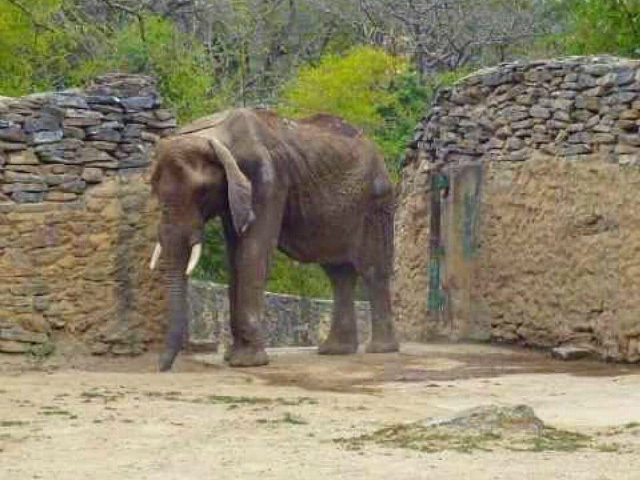Venezuelan dictator Nicolás Maduro has dismissed reports of a starving African elephant, the only one in the country, in a nation that lost twenty pounds on average in 2016, claiming there is a right-wing conspiracy to create a “media show… to demoralize the people” into no longer supporting socialism.
On his weekly television program Sunday, Maduro told the story of an alleged environmental fraud involving a hippopotamus in El Salvador and compared the incident to the story of Ruperta, the only African elephant in Venezuela.
Ruperta, who lives at the Caricuao Zoo in Caracas, is reportedly suffering from severe malnutrition, and photos of the emaciated elephant began to circulate on social media after a local journalist began disseminating them.
“Two weeks ago they began to discuss the beloved elephant Ruperta,” Maduro said on his program. “She is at an advanced age. They wrote a whole novel, a show and on social media groups begin to say bad things to demoralize the people and children with this.”
“They put those messages out on Sunday evenings and at night to ruin your week, but citizens need to know how to confront this war to drive young people crazy, crazy with hate,” Maduro concluded.
Maduro accused the media – without specifying whom it is that is attempting to demoralize the country – of “affecting the psyche” of Venezuelans by exposing the starving animal to the world.
Ruperta is either 45 or 46 years old, according to various reports. The average African elephant lives between 65-70 years in captivity, making Ruperta of middle, but not “advanced,” age.
Maduro has previously dismissed the growing food crisis in Venezuela, which inches every day closer to famine, on his television program in the past. In September, Maduro joked about the food crisis’s nickname among Venezuelans: the “Maduro diet.”
“Maduro’s diet gets you hard – no need for Viagra!” Maduro said on national television, complimenting a soldier for appearing thin.
A poll released in February found that three of four Venezuelan lost nearly 20 pounds in 2016. Over 90 percent of Venezuelans cannot secure three meals a day for themselves, and an estimated 15 percent of Venezuelans rely on scavenging through commercial garbage for food.
The animals at Caricuao have not been immune to the food crisis, with Ruperta its most famous animal victim.
Officials at the zoo have denied that Ruperta is emaciated, instead claiming that she has been suffering dehydration and diarrhea after eating too much squash and have ceded the elephant has lost a significant percentage of her weight. The squash itself, however, was provided as alternative nutrition in light of the growing food crisis in the country.
“We have enough food and the animals at Caricuao are well-fed,” chief zookeeper Erick Lenarduzzi told reporters.
The reporter who broke the story, Román Camacho, refuted the official zoo version of events, telling the Miami Herald that a zookeeper at Caricuao alerted him to the deteriorating state of the elephant and stated malnutrition was to blame.
The Venezuelan newspaper El Nacional reported last week that, despite the dire food situation in the country, the zoo’s neighbors organized a food collection for Ruperta, collecting food fit for elephant consumption: carrots, oranges, pineapples, and chard, among other local vegetables. Denying that she was suffering from malnutrition, zoo officials rejected the food donations.
According to El Nacional, Ruperta is not alone. A puma resident of the zoo died in February after zookeepers reportedly used expired anesthetic medications to subdue the animal. A month earlier, officials reportedly removed the zoo’s jaguar from display due to apparent signs of malnutrition.

COMMENTS
Please let us know if you're having issues with commenting.